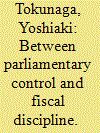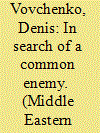|
|
|
Sort Order |
|
|
|
Items / Page
|
|
|
|
|
|
|
| Srl | Item |
| 1 |
ID:
192268


|
|
|
|
|
| Summary/Abstract |
The present article is devoted to the study of ethnic representation in the works of Kurdish painters. Specific features of the Kurdish ethnic worldview and its relation to the representation of ethnic themes in the works of various artists were revealed. The purpose of the analysis of Kurdish ethnic components in the works of Iranian Kurdish painters was to classify the themes according to important ethnic values Kurds into more comprehensive groups. In the first stage, the ethnic components used in the works of the painters were extracted, secondly, they were categorized into more comprehensive groups. The components adopted in the works of Kurdish painters were categorized in more inclusive categories, which eventually were classified into six groups: Nature, Myths and Heroes, Typical Kurdish Appearance, Cultural Traditions, History and Native Architecture.
|
|
|
|
|
|
|
|
|
|
|
|
|
|
|
|
| 2 |
ID:
192267


|
|
|
|
|
| Summary/Abstract |
The budget system is a fundamental component of modern constitutional politics. It works for the establishment of not only the fiscal discipline, but also for parliamentary control over tax and fiscal policies. This study aims to portray controversy between these two principles over the legislation of the General Budget Act for 1303/1924-25, the first comprehensive budget law in Iran. An analysis of parliamentary and other contemporary sources reveals how the National Assembly prioritized their control over budget-making, whereas Administrator General of Finance Millspaugh (1922–1927) struggled to maintain fiscal discipline. The lack of cooperation between them consequently benefitted Prime Minister Reza Khan (1923–1925; later Reza Shah Pahlavi 1925–1941), who desired to seize full control of state finance. These findings contribute to a deeper understanding of the constitutional politics on the eve of Pahlavi rule, as well as the process of Reza Khan’s rise to power.
|
|
|
|
|
|
|
|
|
|
|
|
|
|
|
|
| 3 |
ID:
192265


|
|
|
|
|
| Summary/Abstract |
Since its establishment in 1961 the Mount Carmel Training Centre, located in Haifa (Israel), has had a significant as well as unique role as a bridge to North-South relations. This article focuses, however, on a less known but not less important role of the center, namely its contribution to the development of Israeli-Swedish bilateral relations. The success of the joint venture derived not only from the fact that Israel and Sweden acted upon similar socialist values at the time, but also that both greatly benefitted from it: the young Israeli state, lacking in financial resources and not least in international allies, enjoyed a Swedish substantial budget supplement and the constructive rapprochement between the countries that followed; while Sweden, joining rather late the race of developed countries to the recently established African states, enjoyed Israel’s pioneering experience in the field of development aid. Thus, the article presents an intriguing case study of the winding ways that knowledge circulated within the dominant Social Democratic mid-twentieth century sphere of influence.
|
|
|
|
|
|
|
|
|
|
|
|
|
|
|
|
| 4 |
ID:
192266


|
|
|
|
|
| Summary/Abstract |
Higher education is a key component of human capital and is positively linked to improving the economic, social, and personal aspects of life. This study aims to examine how people living under circumstances of dramatic sociopolitical change perceive the opportunity to pursue higher education and the social and personal meaning they attach to it. The Druze community on the Golan Heights serves as a case study. This community has undergone dramatic changes since the outbreak of the Syrian civil war, reflected among other things by enhanced interactions with Jewish and Israeli society. The results of semi-structured interviews with young adults in the community who studied at Israeli higher education institutions indicate that interviewees perceive their studies as increasing their sense of security. While some interviewees described rational considerations in choosing where and what to study, others made choices that in the short term might lead to economic losses. Nevertheless, their rationalization of these choices based upon preserving the local social fabric can contribute to their sense of security in the long run. Their perceptions regarding increasing integration into Israeli society are mixed and reveal a pragmatic approach.
|
|
|
|
|
|
|
|
|
|
|
|
|
|
|
|
| 5 |
ID:
192260


|
|
|
|
|
| Summary/Abstract |
The uneasy Putin-Erdogan partnership reminds of the early twentieth-century trends in the Russo-Turkish relations – taking advantage of each other’s dissidents vs cooperating against Western imperialism. Imperial Russia tended to indulge in the former which undermined the latter tendency in its policies in regards to the Young Turk regime who were similarly making irredentist overtures to Russian Muslim minorities. Both sides were also tempted or constrained by their existing or potential Great Power allies. In contrast, the partnership between the Soviets and Mustafa Kemal Ataturk would be more consistent as they minimized meddling in each other’s internal affairs to jointly oppose European encroachments. This article also shines a new archival light on the motivations of the Soviet side while highlighting the less well-known opposition to close cooperation between traditional rival empires on all levels of Soviet leadership. There is no scholarly work focusing on the 1908–1923 period in a single monograph or article (from the Young Turk revolution to the Lausanne negotiations). Looking at both sides of the 1917 divide reveals surprising continuity between the imperial and the Soviet policies despite the earthshattering effects of the First World War.
|
|
|
|
|
|
|
|
|
|
|
|
|
|
|
|
| 6 |
ID:
192259


|
|
|
|
|
| Summary/Abstract |
The Karapapaks were one of the less known native Turkish ethnic groups of the Transcaucasia, who overwhelmingly took refuge in the Ottoman and Qajar Empires in the late 1820s, after the expansion of Tsarist Russia into their homelands. This paper analyses how the literature regarding Karapapak movements and society was overwhelmingly shaped by selective, essentialist, and anachronistic approaches by some historians in Turkey and Iran. While the former determined that they were a loyal pro-Ottoman and pro-Sunni Karapapak society, the latter constructed an opposing pro-Iranian and pro-Shiite narrative. This paper deconstructs both approaches, and asserts that the collective ethnic and sectarian identities of this society played a secondary role in regards to influencing their cross-border movements. This paper argues that the approach of the current literature cannot explain this borderland society’s perpetual, multiple and multi-directional cross-border movement. Instead, the Karapapaks often manoeuvred the frontiers of the empires, and defected to another empire when it was necessary to, first and foremost, satisfy the needs of their own society, over those of any imperial allies.
|
|
|
|
|
|
|
|
|
|
|
|
|
|
|
|
| 7 |
ID:
192262


|
|
|
|
|
| Summary/Abstract |
The National Pact Project, which was approved by the Turkish parliament and became official on 28 January 1920, was approved by the Ottoman Assembly. It envisaged the security of the Turkish presence in the region, which considered Anatolia as the axis, and was based on the thesis that this security started in Northern Iraq and Northern Syria. There was a Turkish-British rivalry with the central theme of oil in Northern Iraq. Ultimately, the winner was England, which had military and political power. According to the Turkish side, the separatist movements that emerged in the last period after the Cold War and concentrated in the south of Turkey, especially in Northern Iraq, revealed the realistic aspect of the National Pact project, which was developed against possible security gaps. However, Turkey has never put the project into practice, and limited operations in areas close to the borderlines have been sufficient.
|
|
|
|
|
|
|
|
|
|
|
|
|
|
|
|
| 8 |
ID:
192264


|
|
|
|
|
| Summary/Abstract |
Iran’s simultaneous relations with Israel and the Arab world have received insufficient scholarly attention. After the Second World War, Iran accustomed itself to the shifting power plays in the Middle East. The thirty years between 1945–1975 witnessed the waning of Iran’s influence in the Persian Gulf and the rise of Egypt, Israel, and Saudi Arabia. During much of the Nasser era, until Egypt’s defeat in 1967, Iran’s relationship with Egypt remained tense. Fervent Arab nationalist ideologies identified the shah’s Iran as a state aligned firmly with the West. Iran’s support for Israel became a frequent negative target of the Arab press. In the Persian Gulf, however, Iran did not see eye-to-eye with America or Britain and tried to forge a separate path with Saudi Arabia and the newly configured countries. Iran had to tread gingerly to maintain amicable relations with its neighbors. In the end Iran could only adequately safeguard its security as its regional isolation became the new reality.
|
|
|
|
|
|
|
|
|
|
|
|
|
|
|
|
| 9 |
ID:
192263


|
|
|
|
|
| Summary/Abstract |
This article challenges conventional opinions that assume ever-presence of anti-Americanism among Turkish socialist leftist groups and that sees the Marxist account of the international as must-be theoretical tool of socialist leftists by investigating how they perceived the US and Soviet Russia during the immediate aftermath of the Second World War, as well as how they evaluated the pre-Second World War world order and changes in global politics after the war. It finds that leftists considered the existing inter-imperialist rivalry-driven international structure to be the main cause of world wars but expected that the US would replace it with a cooperation-based structure that would lead to lasting peace. They characterized the US as a peacemaker, as an anchor for democratization in Turkey, and saw the USSR as being pro-peace and viewed with suspicion Soviet demands for land from Turkey. Lastly, the article explores socialist leftists’ eclectic theoretical framework, which was a combination of imperialism theory, realism, and liberalism, as a window onto their views of international relations.
|
|
|
|
|
|
|
|
|
|
|
|
|
|
|
|
| 10 |
ID:
192261


|
|
|
|
|
| Summary/Abstract |
This article explores the Chinese Xinhai revolutionaries’ views of the Young Turk Revolution in 1908, and the Young Turks’ semi-official organ Tanin’s coverage of the Chinese Xinhai Revolution in 1911. The Chinese and Ottoman revolutionaries were greatly interested in each other. And there was a striking similarity between their views of each other: both the Chinese and Ottoman revolutionaries analyzed each other’s revolution in the context of international politics. They knew a revolution in the other country would change that country’s position in international politics and impact the great powers’ thinking and behavior, and the response of the great powers in turn would have an influence on the fate of their own country. For Chinese revolutionaries, the Young Turk Revolution proved the need for a revolution in China. The revolutionaries’ interests in each other and similarity in their views proved an important but neglected intellectual connection between revolutions in the early twentieth century.
|
|
|
|
|
|
|
|
|
|
|
|
|
|
|
|
|
|
|
|
|